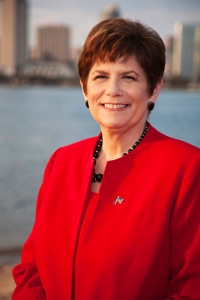
“I am wearing a pink tie. My opponent is not. Pink ties are the most important issue in this debate, so I should win.”
In tournament debate parlance, this is known as the “Tie Paradigm” – pick a color that matches your wardrobe. It is an absurd point to make in an argument about pension reform or health care, so absurd as to be overlooked. Therein lies its power.
Despite bluster about facts, ideas and oration, debates are about scoring points. If your opponent doesn’t respond to an argument, no matter how bizarre, you win the point. Simply say “Tie color has no bearing on the question at hand,” and Pink Tie loses. Fail to respond, and judges may feel compelled to vote against you for not wearing a pink tie. Fail to be present, and all the arguments may be scored for your opponents, a point apparently lost on Councilman Carl DeMaio and District Attorney Bonnie Dumanis.
Demaio and Dumanis were no-shows at the first debate in the 2012 race for San Diego Mayor, despite invitations from organizers. Even a letter coauthored by their opponents, Democratic Congressman Bob Filner and Republican Assemblyman Nathan Fletcher, could not convince them to engage.
Yes, it’s ridiculously early to be having a debate for an election in June 2012. But it’s what we do now. Yes, only a minority of voters are paying attention. But democracy works better when people are involved. Those who are interested should be encouraged – not told that candidates are too busy for participatory democracy.

Tactical reasons to skip debates exist, but they hardly apply here. Candidates that are clearly better known, or of higher office, can seem stronger by refusing to “punch down” on small time competitors. A sitting California assemblyman and U.S. Representative are hardly fringe candidates to be dismissed. Both have been elected by larger constituencies than DeMaio, and their votes affect more people than Dumanis. There can also be an exception for candidates who haven’t joined a race (see Palin, Sarah). That hardly covers DeMaio, the first declared candidate, or Dumanis, who has been racking up endorsements since March.
The “too busy doing my job” argument also fails. Despite their duties to the electorate, DeMaio and Dumanis both found plenty of time to have their campaigns reach out to potential supporters in the past few weeks. How much more time would debate preparation have taken?
Fletcher and Filner are as busy as Dumanis and DeMaio, and I have no doubt the latter two campaigns will tell us if the former miss votes while running for mayor. Yet both the assemblyman and the representative were able to prepare for these and other questions.
DeMaio’s campaign suggested that his sole focus, until October, would be his pension reform initiative, not the mayoral race. This makes no sense. The pension initiative is DeMaio’s mayoral campaign, at least at the moment. He should have relished the chance to either double down on reform or to hedge his bets on other city issues.
Still, DeMaio’s position makes more sense than Dumanis’ unwillingness to debate until March 8. Avoiding debates until all the candidates were declared might seem a courteous gesture, but only if she were holding off on fundraising and endorsements as well. Instead, the district attorney appears afraid to face a jury of her electorate.
Our mayoral debates could feature four candidates trained in different forms of combat: a Marine, a freedom rider, a district attorney, and a self-made millionaire. San Diegans should demand nothing less, and penalize those who don’t show – no matter what color tie they wear.











Is it significant that the candidtes whose names begin with F made the debate, while those whose names begin with D did not??